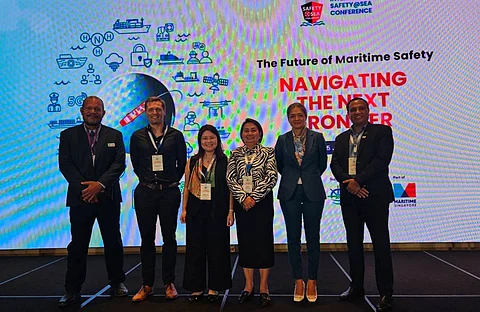
- NEWS
- the EDIT
- COMMENTARY
- BUSINESS
- LIFE
- SHOW
- ACTION
- GLOBAL GOALS
- SNAPS
- DYARYO TIRADA
- MORE

As merchant ships adopt zero or near-zero emission technologies to reduce greenhouse gas (GHG) emission, the administrator of the Maritime Industry Authority (Marina) called for a parallel modernization of seafarers to ensure maritime safety.
“Right now, there is a noticeable gap between the pace of regulatory and technological changes and the preparedness of the workforce expected to implement them,” Marina chief Sonia Malaluan said at the International Safety@Sea Conference in Singapore on Tuesday.
With the revised International Maritime Organization GHG Strategy adopted in 2023 coming into force in October, Malaluan emphasized that these ambitions must be matched with equally robust investment in skills, competencies, and support systems for seafarers.
“Seafarers are being asked to adapt to unfamiliar technologies — such as alternative fuels and automation systems — without the benefit of proven training methodologies or operational experience,” she said.
With this, the Philippines, is “reframing its approach and making it more human-centered,” prioritizing early engagement with seafarers in developing and piloting new technologies, according to Malaluan.
The Marina chief highlighted the recent approval of the Generic Interim Guidelines on Training for Seafarers on Ships Using Alternative Fuels and Technologies at MSC 110 in June, noting that the Philippines’ support for the guidelines during HTW 11 (Sub-Committee on Human Element, Training and Watchkeeping, 11th session) earlier this year, and its commitment to using these as a foundation for updating training programs.
“We are optimistic that the GHG framework will help bridge the gap between innovation and workforce preparedness,” she said. “Yes, training is key and crucial for the safe operations of ships using alternative fuels and new technologies. And when we talk of safety, we should all be onboard — the governments, international organizations, shipowners, seafarers, and all stakeholders — leveraging partnerships and collaboration.”
The International Safety@Sea Conference 2025 gathered global maritime safety experts, regulators, and stakeholders to address current and emerging risks in shipping, including those arising from decarbonization and digital transformation.
